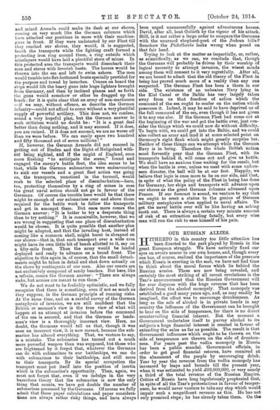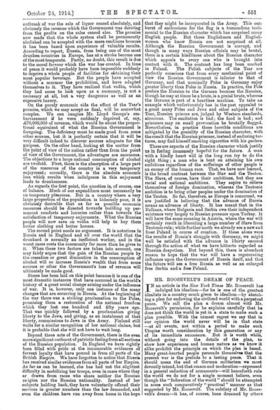OUR RUSSIAN ALLIES. H ITHERTO in this country too little attention
has been directed to the part played by Russia in the great European struggle. We have naturally fixed our eyes on events nearer to our own homes, and, though every one has, of course, realized the importance of the pressure which Russia is exerting in the east, we have not had time to think about the moral forces which lie behind the Russian armies. These are now being revealed, and certainly the most striking of all recent revelations is the Tsar's announcement that the Russian Government will for ever dispense with the huge revenue that has been derived from the alcohol monopoly. That monopoly was established a good many years ago, and, as may readily be imagined, the effect was to encourage drunkenness. As long as the sale of alcohol is in private hands in any country the influence of the Government can be brought to bear on the side of temperance, for there is no direct countervailing financial interest. But the moment a Government undertakes itself to purvey alcohol to its subjects a huge financial interest is created in favour of extending the sales as far as possible. The result is that Government influences which ought to be thrown on the side of temperance are thrown on the side of drunken- ness. For years past the vodka monopoly in Russia has been a public scandal. Government officials, in order to get good financial returns, have connived at the abasement of the people by encouraging drink. Year by year the revenue from the vodka monopoly has increased by leaps and bounds till the present year, when it was estimated to yield £93,000,000, or very nearly a third of the total revenue of the Russian Empire. Critics of Russia have long lugubriously prophesied that, in spite of all the Tsar's protestations in favour of temper. ance, he would never venture to take any step which would impair such a magnificent revenue as this. He has not only promised steps; he has already taken them. On the outbreak of war the sale of liquor ceased absolutely, and obviously the revenue which the Government was deriving from the profits on the sales ceased also. The promise now made that the whole system shall be permanently abolished can be accepted with the more readiness because it has been based upon experience of valuable results. According to report, Russia, from being one of the most drunken countries in Europe, has at a stroke become one of the most temperate. Partly, no doubt, this result is due to the moral fervour which the war has created. In time of peace it would probably have been impossible suddenly to deprive a whole people of facilities for obtaining their most popular beverage. But the people have accepted without a murmur the prohibition, and have adapted themselves to it. They have realized that vodka, which they had come to look upon as a necessary, is not a necessary at all, but a very dangerous as well as an expensive luxury. On the purely economic side the effect of the Tsar's promise, which we may accept as final, will be somewhat complex. We can imagine Mr. Lloyd George's em- barrassment it he were suddenly deprived of, say, £70,000,000 of revenue, which would be about the propor- tional equivalent of what the Russian Government is foregoing. The deficiency must be made good from some other sources, but it is perfectly certain that it will be very difficult indeed to discover sources adequate for the purpose. On the other hand, looking at the matter from the point of view of the nation rather than from the point of view of the Government, the advantages are enormous. The objections to a large national consumption of alcohol are twofold. First, there is the absorption of a large part of the resources of the country in a very temporary enjoyment ; secondly, there is the absolute economic loss which results when indulgence in this enjoyment leads to drunkenness.
As regards the first point, the question is, of course, one of balance. Much of our expenditure must necessarily be on temporary pleasures. But in a country where a very large proportion of the population is hideously poor, it is obviously desirable that as far as possible economic resources should be directed towards building up per- manent comforts and luxuries rather than towards the satisfaction of temporary enjoyments. What the Russian people will now save on vodka will help to buy them better clothing and better houses.
The second point needs no argument. It is notorious in Russia and in England and all over the world that the drunkard is normally an inefficient worker, and in the worst cases coats the community far more than he gives to it. When these two factors are taken into account, one may fairly argue that the gain of the Russian people by the cessation or great diminution in the consumption of alcohol will so increase Russia's wealth that from some sources or other the Government's loss of revenue will ultimately be made good.
Stress has been laid on this point because it is one of the most dramatic instances that have occurred in the world's history of a great social change arising under the influence of war. It is, however, only one instance of the many changes that are occurring in Russia. At the beginning of the war there was a striking proclamation to the Poles, promising them a restoration of the national freedom which they lost one hundred and fifty years ago. That was quickly followed by a proclamation giving liberty to the Jews, and giving, as an instalment of that liberty, commissions to Jews in the Army. Finland still waits for a similar recognition of her national claims, but it is probable that she will not have to wait long.
Beyond these acts of the Government, there is the even more significant outburst of patriotic feelingfrom all sections of the Russian population. In England we have rightly been filled with pride at the innumerable evidences of fervent loyalty that have poured in from all parts of the British Empire. We have forgotten to notice that Russia has received similar evidences from all parts of her Empire. As far as can be learned, she has had not the slightest difficulty in mobilizing her troops, even in cases where they ar drawn from races who share neither the Russian re igion nor the Russian nationality. Instead of her subjects holding back, they have voluntarily offered their services in greater numbers than the law demanded, and even the children have run away from home in the hope that they might be incorporated in the Army. This out- burst of enthusiasm for the flag is a tremendous testi- monial to the Russian character which has surprised many English people. But those Englishmen and English- women who know Russia are not surprised at all. Although the Russian Government is corrupt, and though in many ways Russian officials may be brutal, there is a certain kindliness about the Russian character which appeals to every one who is brought into contact with it. The contrast has long been marked in Poland. The Polish subjects of the Tsar are perfectly conscious that from every mechanical point of view the Russian Government is inferior to that of Germany, and that nominally Poles in Germany enjoy greater liberty than Poles in Russia. In practice, the Pole prefers the Russian to the German because the Russian, though he may at times be a brute, is a genial brute, whereas the German is part of a heartless machine. To take an example which unfortunately has in the past appealed to a great many Poles and Jews and other subjects of the Tsar, Russian prisons are, judged by Western standards, atrocious. The sanitation is bad ; the food is bad ; and prisoners may on small provocation be brutally flogged. Nevertheless, in practice these horrible conditions are mitigated by the geniality of the Russian character, with the result that the Russian prisoner, instead of enduring tor- tures, may find himself smoking cigarettes with his gaolers.
These are aspects of the Russian character which justify us in feeling immensely hopeful for the future. A man with a kindly heart will in the long run try to do the right thing ; a man who is bent on attaining his own ambitions regardless of the sufferings of other people is an enemy of the human race. That, we have now learned, is the broad contrast between the Slav and the Teuton. The Slays, of course, have their ambitions, but they are racial and national ambitions. They aspire to relieve themselves of foreign domination, whereas the Teutonic ambition is to bring other peoples under the domination of the Teuton. So far, therefore, as Europe is concerned, we are justified in believing that the advance of Russia means an advance of liberty. It has meant that in the Balkans, where Bulgaria and Serbia owe their independent existence very largely to Russian pressure upon Turkey. It will have the same meaning in Austria, where the war will certainly result in liberating a large number of Slave from Teutonic rule ; while further north we already see a new and freer Poland in course of creation. If these alone were the results of Russia's struggle with Germany, we might well be satisfied with the advance in liberty secured through the action of what we have hitherto regarded as Russian despotism. But beyond this, there is abundant reason to hope that the war will have a regenerating influence upon the Government of Russia itself, and that the future will see a free Russia as well as an enlarged free Serbia and a free Poland.



































 Previous page
Previous page